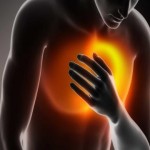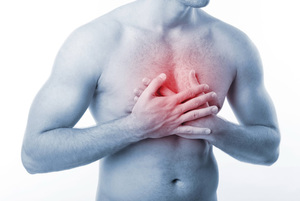Sensation of warmth in the chest. Burning sensation in the middle of the chest: causes and methods of treatment. Pathologies that cause burning.
A burning sensation in the chest is quite often a phenomenon that scares and interferes with a full life. Fear is caused by the fact that a person experiences unpleasant sensations in the chest area, next to the heart, which sometimes leads to dacha to panic. In fact, there are not many reasons for a burning sensation in the chest, and we will analyze each of them.
And to begin with, let's immediately determine that this feeling occurs most often for three reasons:
Burning sensation in the chest in the middle and on the left
Besides, a large number of other gastric and intestinal disorders can lead to symptoms of burning, nausea, and vomiting. When vomiting, a person may also spew out pieces of food or feel as if food is stuck in the top of the chest. Other symptoms that can be associated with reflux include difficulty swallowing and excessive salivation. Blood in the vomit indicates potentially serious damage to the esophagus or stomach.
The main signs of the disease
Chronic or persistent symptoms are a symptom that can ultimately cause long-term injury. The esophagus may be damaged together at points called strictures, or the tissue lining of the esophagus may begin to become precancerous.
- Disease and problems in the digestive system.
- Diseases of the lungs and cardiovascular system.
- With psychological disorders, stress, psychological stress.
Digestive cause
Let's start with the most common cause of chest burning, which has several "branches":
- Heartburn. You can give a prize to this disease, as the most common reason burning in chest... Moreover, the sensation of heartburn, and with it a burning sensation, can spread throughout the esophagus, felt in the throat.
Important! It is extremely simple to diagnose heartburn, because this sensation can last from minutes to several hours, but the main symptom is sour belching.
As acid reflux affects other areas, complications in the respiratory system, throat and mouth can develop. Chronic cough, hoarseness, asthma, dental problems, damaged teeth, and sinus problems may indicate reflux in addition to damage to the esophagus.
Symptoms may get worse or better at night. With a spinal acid reflex, symptoms worsen when the person is lying down and sleeping. In vertical acid reflux, symptoms begin when the person is upright and conscious. In one recent study, people who had an injury - erosive esophageal reflux disease - had more frequent reflux episodes, longer episodes, and more episodes occurring at night while lying down, compared to people who had reflux but no erosive damage.
It is quite possible to eliminate the feeling of heartburn. in simple ways, including a pinch baking soda for a glass of water, for example, or a piece raw potatoes... Sometimes simple sunflower seeds are used to relieve heartburn. In addition, there is also medications, which are designed to reduce the level of acidity in the stomach, and at the same time to deal with heartburn.
As you sleep, you may not notice that you are experiencing heartburn. Other people experience heartburn, which is so painful that it is difficult to sleep through the night. Many people with persistent heartburn cannot fully rest overnight. Certain foods can cause symptoms. These include fatty foods, high-fat meats, butter, mayonnaise, cream sauce, salad dressing, chocolate, dairy products, and caffeinated beverages. Citrus and acidic foods can also cause symptoms.
Sometimes a heart attack feels like heartburn. If you or any of you have symptoms of a heart attack, seek immediate medical help by typing. Barrett's esophagus is a condition that results from acid reflux over the longer term. The normal esophageal lining is damaged and the intestinal lining is replaced. Those with Barrett's esophagus are 30 times more likely to develop a type of esophageal cancer known as esophageal adenocarcinoma. Warning signs include weight loss, pain while eating, trouble swallowing, and blood in the vomit.
- Esophagitis reflux. It's already over serious reason, since we meet with inflammation of the esophagus. With this disease, gastric juice begins to eat away at the walls of the esophagus. Inflammatory lesions and burning sensation in the chest are formed. If the burning sensation is localized in the lower part of the chest, then it can develop into a constant sensation.
To avoid further progress in the spread of inflammation and burning sensation, it is recommended that after a meal not be in a horizontal position for more than 2 hours, that is, do not lie down.
According to the American Gastroenterological Association, people with multiple risk factors for this cancer should be screened for Barrett's esophagus. Talk to your doctor about your heartburn symptoms. Frequent heartburn may require medication. If symptoms are mild and occasional, lifestyle changes may be recommended. If you notice that certain fatty foods cause heartburn, then you should do your best to avoid them. If you notice that large portions are causing acid reflux, try eating fewer meals throughout the day.

In addition, adherence to a certain diet will be required, in which fatty and spicy food, alcohol, nicotine
Heart diseases
First of all, heart disease can be the cause of burning in the chest and pain in the chest. At the same time, it is necessary to add to the symptoms the feeling of squeezing the chest, as if a slab was placed on it. The patient may even begin to choke. All this indicates problems with the heart and circulatory system.
Stress can also trigger heartburn symptoms, so try to maintain balanced image life. The stress and lack of sleep that sometimes come with concern are not good for heartburn. If you burn candles at both ends, step back, listen to your body and watch your symptoms. Also, consider asking others for help so you can sleep well, or allowing yourself a little more time for yourself.
Caring for someone with heartburn and heart disease can be particularly stressful. It can help your trust at home to have a good talk with your doctor about heart warning and anxiety symptoms, especially your loved one. It can boost your ability to give confidence when needed.
The most common problem in this context is angina pectoris. This is a condition of the heart muscle, in which oxygen from the blood ceases to flow to it in the required amount.
The most common causes of problems with the flow of oxygen in the blood to the heart are cholesterol plaques, which attach to the inner walls of blood vessels, and slow down the blood supply to the heart.
The American Gastroenterological Association has announced the management of Barrett's esophagus. People with digestive disorders may have one or more following symptoms... You haven't eaten most of your food, but you already feel full and may not be able to finish eating. You feel light and severe pain In the area between bottom sternum and navel. Burning in the upper abdomen. You feel an uncomfortable heat or burning sensation between your lower sternum and your navel. Bloating in the upper abdomen, you feel an uncomfortable feeling of tightness. Nausea. You feel as if you want to vomit.
- Early fullness with meals.
- Uncomfortable fullness after eating.
- Fullness lasts longer than necessary.
- Discomfort in the upper abdomen.
Naturally, with increased physical exertion, the heart begins to work faster and it needs more blood. As a result, there is a burning sensation and pain in the chest, because it does not allow the heart to receive required volume oxygenated blood.
Important! With angina pectoris, a thorough doctor's consultation and cardiological examination are necessary. Angina pectoris can lead to ischemic disease heart and myocardium.
Sometimes people with indigestion also experience heartburn, but heartburn and indigestion are two separate conditions. Heartburn is pain or burning sensation in the center of your chest that can radiate to your neck or back during or after a meal. A mild upset stomach is usually nothing to worry about. Check with your doctor if discomfort persists for more than two weeks. Seek medical attention immediately if pain is severe or accompanied.
Seek medical attention immediately if you have.
- Unintentional weight loss or loss of appetite.
- Repeated vomiting or vomiting of blood.
- Black, tarry stools.
- Swallowing problems that get worse.
- Fatigue or weakness, which may indicate anemia.
Lung diseases
There may be several more reasons here, simply because many colds cause similar symptoms. So, a burning sensation in the chest can cause:
- Pulmonary pleurisy or bilateral pneumonia.
- Almost anyone.
- In rare cases, sore throat and inflammation in the throat.
- Violent dry cough, which is characterized by many as "tearing".
Any pneumonia, which is always accompanied not only by fever, but also strong cough, leads to the fact that there is a burning sensation in the chest. Interestingly, even after a person is completely cured of pneumonia, he still has a burning sensation in his chest from time to time.
- Shortness of breath, sweating, or chest pain emitting from the jaw, neck, or arm.
- Chest pain on exertion or stress.
Video: What is the reason for chest pain? Is it dangerous
Overeating or eating too much Fatty, fatty, or spicy foods Too much caffeine, alcohol, chocolate, or soda Smoking Anxiety Certain antibiotics, pain relievers, and iron supplements. Sometimes an upset stomach is caused by other digestive conditions, including.
In this case, the pain and burning sensation can be located either in the center, or shift to one of the sides on the sides, it all depends on which lung is more affected. And sweat with bilateral pneumonia, a burning sensation will already be felt throughout the chest.
Other inflammatory colds can be characterized by similar signs and symptoms, including a burning sensation in the chest.
Diseases of other organs
Gastritis Peptic ulcers Celiac disease Gallstones Constipation Pancreas Stomach cancer Intestinal block Decreased blood flow in the intestines. An upset stomach for no apparent cause is known as functional or non-ulcer dyspepsia. While indigestion usually doesn't have serious complications, it can affect your quality of life, making you feel uncomfortable and making you eat less. You may be missing work or school because of your symptoms. When indigestion is caused by an underlying condition, the condition can also have complications of its own.
Psychological disorders
In addition to the fact that a burning sensation can manifest itself as a result of problems with internal organs, this sensation is often the cause of strong psychological experiences and tension on the emotional level.
Stress can lead not only to a feeling of squeezing in the chest, but also to a burning sensation. In this case, the burning sensation can be characterized as quite deep, and does not depend in any way on the position of the body.
Mindfulness-based treatments for functional gastrointestinal disorders: a meta-analysis. Effectiveness of acupuncture treatment for functional dyspepsia: a systematic review and meta-analysis. Many conditions can cause pain below the sternum. Some types of abdominal pain appear in the upper mid abdomen, below the sternum or sternum. Upper abdominal pain can be mild, moderate, or severe, depending on the cause of the pain and the tissues involved.
Acute pancreatitis can cause joint pain or pain below the sternum. The pancreas is a long, thin gland and organ located behind the belly in the upper abdomen. The pancreas produces digestive enzymes and hormones that help glucose or sugar to process in the blood. Pancreatitis can occur as acute pancreatitis or chronic pancreatitis. Acute pancreatitis occurs suddenly, whereas chronic pancreatitis occurs over the years.
V in this case neither diet, nor refusal of drugs help, the reason is at the level of psychoemotional perception.
Together with a burning sensation in the chest, it can be noted that a person falls into apathy, his appetite decreases, his concentration disappears, he becomes irritable.
In any case, without examination, establish true reason burning sensation in the chest is impossible, as well as choosing the right therapy to eliminate this feeling.
Common signs and symptoms associated with acute pancreatitis include pain in the upper abdomen or below the sternum, back pain, abdominal pain that is worse after eating, nausea, vomiting, and soreness abdominal cavity. Possible reasons acute pancreatitis include alcoholism, cystic fibrosis, and family history pancreatitis.
Inferior petal pneumonia Inferior pulmonary pneumonia can cause chest pain. The University of Maryland Medical Center states that pneumonia, including pneumonia in the lower lung lobes, is an inflammation of the lung tissue caused by bacterial or viral infections... In some cases, pneumonia can be caused by chemicals that irritate the lungs. The immune system healthy person usually does not make it difficult to prevent pneumonia infections, although in people with weakened the immune system pneumonia develops more easily. Common signs and symptoms associated with lower lobe pneumonia include severe abdominal pain below the sternum, fever and chills, dry cough, nausea, vomiting, muscle pain, fast breathing, increased heart rate, and shortness of breath. Abdominal muscle deformity. An abdominal protector or partial rupture of the fibers that make up the abdominal muscles can cause pain below the sternum. According to the Sports Injury Clinic's website, the abdominal muscles usually originate in the rectus abdominis muscle, a paired muscle that runs vertically on the front of the abdominal wall. Abdominal muscle tension are a common injury in athletes, especially athletes who participate in weightlifting, throwing, gymnastics, rowing, wrestling, and pole vaulting. These actions are similar to the fact that they all require rapid movement of the whole body and rapid changes in direction. Common signs and symptoms associated with abdominal muscle tension include pain below the sternum, tenderness in the affected area, and pain when the abdominal muscle is compressed. The Sports Injury Clinic's website states that most abdominal muscles respond well to conservative treatments such as rest, heat, and ultrasound. Chest pain is always scary and can have very serious causes.
Burning sensation in the chest - enough frequent symptom various diseases... This sensation can occur both in the left and in the right side of the chest, or in the middle of it. Many organs are located in the chest area and it is not so easy to determine which of them has failed. This is why it is important to study the symptoms and causes of this condition.
The cause of burning and pain in the chest area
Diseases of the digestive system
The most common cause of a burning sensation in the chest is increased acidity gastric juice. During the digestion of food, the acidic contents of the stomach are thrown into the esophagus (reflux), burning its walls and causing irritation. The burning sensation does not stop, but only intensifies with each meal. Bakes usually in the area of the sternum, right in the middle of the chest.
If it begins to burn and hurt in the sternum in the morning on an empty stomach and disappears when eating, then the cause is the development of esophagitis. This esophageal disorder is also accompanied by nausea, pain when swallowing solid food, and feeling foreign body in the throat. If such symptoms are found, it is necessary to consult a gastroenterologist.
Burning and chest pain may be associated with diseases of the pancreas... In this case, patients complain of burning pain in the left hypochondrium. This condition develops due to spasms of the gastric wall and the development of duodenitis (inflammation duodenum), which is triggered by the multiplication of bacteria.
Colitis is accompanied by similar symptoms, in which the contents of the intestines are thrown back into the stomach, that is, pain and burning also occur in the left hypochondrium.
Burning and pain can also be signs of gastritis or peptic ulcer stomach, in this case, discomfort can be localized in the middle of the chest.
Diseases of the cardiovascular system
Patients with pathology of the heart and blood vessels often complain about "baking in the chest". This symptom is observed when:

If pain and burning sensations occur in the middle of the sternum and are not stopped by a solution of baking soda, but disappear when taking nitroglycerin, then the help of a cardiologist is needed.
Burning and pain in the right side of the chest
Are often a sign of disease respiratory system... Typically, the baking sensation is accompanied by fever, cough, accumulation of fluid in the pleural cavity.
It is the involvement in pathological process pleura is the cause of the burning sensation in the chest.
If pain and burning are accompanied by purulent sputum, it is possible to assume the presence of an abscess or gangrenous lesion of the lung tissue.
Severe burning sensation with right side chest in combination with a strong cough - signs of pneumonia, and the above symptoms with a sharp rise in temperature up to 40 degrees and pronounced leukocytosis in the blood test indicates bilateral pneumonia. An x-ray will help confirm the diagnosis of pneumonia (and the cause of the symptom).
Osteochondrosis
Burning and It's a dull pain in heart frequent signs osteochondrosis thoracic spine. In this disease, heart medications do not improve, but, on the contrary, worsen general state... The cardiogram for osteochondrosis is usually normal.
The manifestations of the disease are as follows:

Mental disorders
A burning sensation in the chest may be a sign mental illness... So, for Parkinson's disease the patient feels pain and heat in the back of the chest, and Alzheimer's disease is accompanied by similar sensations, but in upper parts breasts.
Availability aggressive behavior, combined with a burning sensation in the sternum - characteristic feature depressive syndrome.
Gynecological diseases
The causes of a burning sensation in the sternum can be:
- Pregnancy;
- Mastopathy;
- Lactation;
- Premenstrual syndrome;
- Tumors of the mammary glands.
Burning sensation in the chest is often observed in pregnant women which is related to hormonal changes the body and the preparation of the mammary glands for lactation.
During breastfeeding, cracked nipples may occur, accompanied by painful sensations and burning.
Mastopathy is accompanied by unpleasant sensations in the area of the mammary glands and the formation of painful seals. With mastopathy, observation by a gynecologist or mammologist is necessary.
Premenstrual syndrome is characterized by breast coarsening and discomfort. These symptoms are associated with a change hormonal background and disappear with the onset of menstruation.
Tumors of the mammary glands are accompanied by pain and burning sensation in the chest area, changes and deformation of the nipples and the release of blood or other fluid from them. If you find such symptoms, you should immediately contact a mammologist.
 For cupping this symptom it is necessary to eliminate the cause (underlying disease).
For cupping this symptom it is necessary to eliminate the cause (underlying disease).
If the cause of the symptom lies in heart disease, it is necessary electrocardiography and ultrasound examination hearts. After the diagnosis is made, the cardiologist will prescribe the necessary medications. It is recommended to limit excessive physical exercise taking sedatives.
A burning sensation in the chest with diseases of the respiratory system is often stopped by taking antibiotics, the choice and selection of the dosage of which is determined by the doctor.
Disturbances in work gastrointestinal tract(heartburn) is relieved by the use of antacids, they envelop the mucous membrane, preventing gastric / intestinal juice from destroying it when it is thrown back. At high acidity use drugs that reduce it (omeprazole, ranitidine and others). Besides, it is recommended to stick to a diet(exclude fried, fatty, salty foods, alcohol, tea and coffee, eating often and in small portions.
Burning sensation in the area of the mammary glands with cracked nipples, stop with healing ointments (bepanten), brilliant green solution and infusions medicinal herbs, it is recommended to feed the child with expressed milk. With other pathologies mammary glands treatment is prescribed by a mammologist.
It is possible to use and folk remedies to remove inflammatory processes in internal organs(infusions of sage or chamomile).
Adequate treatment of this symptom is possible only after determining the underlying disease that caused it. Only a specialist should diagnose and prescribe drugs!
